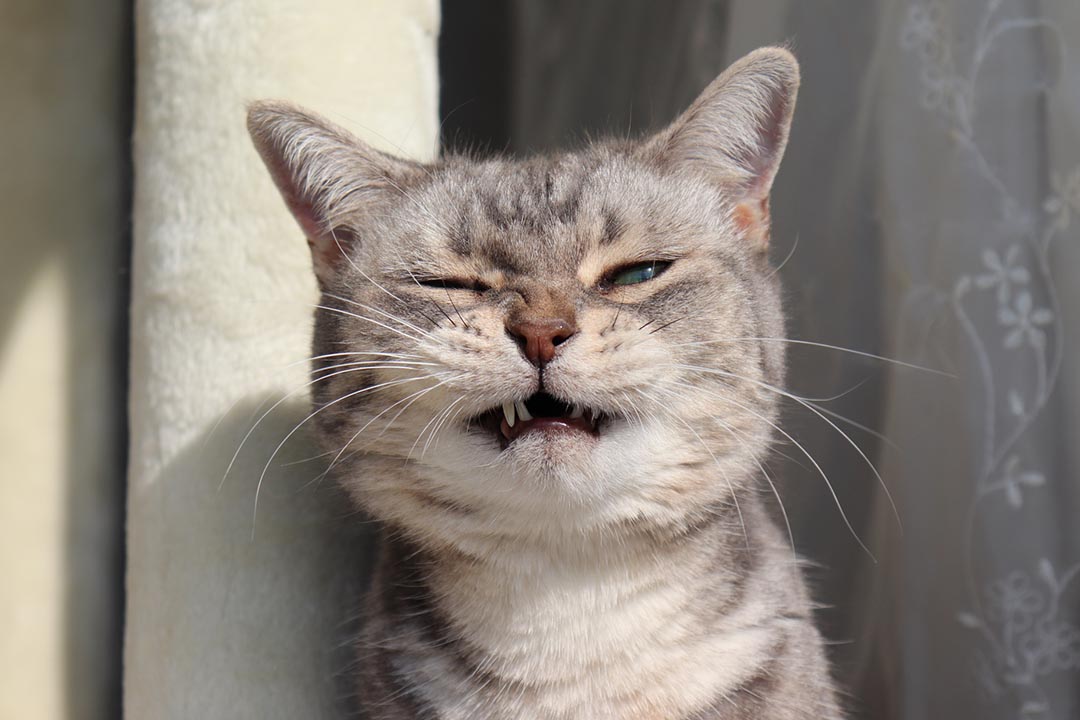If your cat is sneezing a lot, you may worry. Sneezing in cats can signal various issues, from minor to severe.
Cats sneeze for many reasons. It could be dust, allergies, or an infection. Sometimes, it’s just a tickle in their nose. But frequent sneezing might mean something more serious. Understanding the causes helps. It can guide you on whether to see a vet or if home care is enough.
This blog post will explore the common reasons behind your cat’s sneezing. We’ll also provide tips on what to do next. Stay with us to ensure your feline friend stays healthy and happy.
Allergies
Is your cat sneezing a lot? Allergies might be the cause. Cats, like humans, can develop allergies. These allergies can cause many symptoms, including sneezing. Understanding what your cat is allergic to can help you provide relief.
Environmental Allergens
Environmental allergens are common culprits. These include pollen, dust, mold, and even cigarette smoke. If your cat sneezes often, it may be reacting to something in its environment.
- Pollen: Pollen from trees, grass, and flowers can cause sneezing.
- Dust: Dust mites and household dust can be troublesome.
- Mold: Mold spores are another common allergen.
- Cigarette smoke: Smoke can irritate your cat’s respiratory system.
Keeping your home clean can help reduce these allergens. Regular vacuuming and dusting are key. Consider using air purifiers to improve air quality.
Food Allergies
Food allergies can also cause sneezing. Cats can be allergic to certain ingredients in their food. Common food allergens for cats include:
- Beef: Some cats are allergic to beef.
- Dairy products: Milk and cheese can cause issues.
- Fish: Fish is a common allergen.
- Grains: Wheat and corn can trigger allergies.
If you suspect a food allergy, try a hypoallergenic diet. This can help identify the allergen. Consult with your vet for the best approach.
Allergies can make your cat uncomfortable. Identifying and reducing allergens can help. Your cat will thank you for the relief.

Credit: www.pranapets.com
Respiratory Infections
A common cause of frequent sneezing in cats is respiratory infections. These infections can affect the upper or lower respiratory tract. They can be viral or bacterial. Recognizing the symptoms early helps in providing proper care.
Viral Infections
Viral infections are a leading cause of sneezing in cats. The most common viruses are feline herpesvirus and calicivirus. These infections can spread easily among cats.
- Feline Herpesvirus (FHV-1): Causes sneezing, runny nose, and eye discharge.
- Calicivirus: Leads to sneezing, mouth ulcers, and joint pain.
Symptoms of viral infections include:
- Sneezing
- Nasal discharge
- Conjunctivitis
- Lethargy
Bacterial Infections
Bacterial infections can also cause your cat to sneeze often. These infections often follow viral infections. Bordetella bronchiseptica and Chlamydophila felis are common culprits.
- Bordetella bronchiseptica: Causes sneezing, coughing, and nasal discharge.
- Chlamydophila felis: Leads to eye infections and sneezing.
Symptoms of bacterial infections include:
- Persistent sneezing
- Thick nasal discharge
- Swollen eyes
- Fever
Understanding the type of infection helps in seeking the right treatment. Always consult a vet for a proper diagnosis and treatment plan.
Irritants
If your cat is sneezing a lot, irritants in their environment might be the cause. Many common household items can irritate your cat’s nose and respiratory system. Understanding these irritants can help keep your furry friend healthy and sneeze-free.
Household Chemicals
Many household cleaners contain strong chemicals. These can make your cat sneeze. Bleach, ammonia, and air fresheners are common culprits. Always use pet-safe cleaning products. Keep your cat away when you clean.
Dust And Smoke
Dust is another common irritant. It can build up on surfaces and in the air. Vacuum and dust your home regularly. Smoke from cigarettes or fireplaces can also cause sneezing. Keep your home smoke-free for a healthier cat.

Credit: allkindsvet.com
Nasal Blockages
Is your cat sneezing a lot? Nasal blockages might be the cause. Nasal blockages can make it hard for your cat to breathe. They can also lead to frequent sneezing. Let’s explore some common causes of nasal blockages in cats.
Foreign Objects
Foreign objects can get stuck in your cat’s nose. These objects could be small pieces of grass or dirt. When a foreign object is in the nose, your cat might sneeze a lot. This is the body’s way of trying to remove the object.
Common signs of a foreign object in your cat’s nose include:
- Frequent sneezing
- Pawing at the nose
- Nasal discharge
If you suspect a foreign object, take your cat to the vet. The vet can safely remove the object.
Nasal Polyps
Nasal polyps are growths inside the nose. These growths can block the nasal passage. They can cause sneezing and breathing problems. Nasal polyps are not very common, but they can occur in cats.
Symptoms of nasal polyps include:
- Frequent sneezing
- Difficulty breathing
- Nasal discharge
Veterinary treatment is needed to remove nasal polyps. This usually involves surgery. Early detection can help prevent complications.
Dental Issues
Is your cat sneezing a lot? You might be surprised to learn that dental issues can be a cause. Dental problems in cats often lead to various symptoms, including sneezing. Dental health is crucial for your cat’s overall well-being. Let’s explore two main dental issues that could be causing your cat to sneeze.
Dental Disease
Dental disease in cats can lead to sneezing. One common dental disease is gingivitis. This condition causes gum inflammation due to plaque buildup. Cats with gingivitis may have red, swollen gums and bad breath.
Another dental disease is periodontitis. This severe gum infection damages the soft tissue and bone that support the teeth. Cats with periodontitis often experience pain and discomfort. They might sneeze due to the irritation and infection in their mouth.
Regular dental check-ups can help prevent these diseases. Brushing your cat’s teeth and providing dental treats can also maintain good oral health.
Oral Infections
Oral infections can also cause frequent sneezing in cats. Infections can develop from untreated dental diseases. Bacteria from infected teeth and gums can spread to other areas, including the nasal passages.
Common oral infections include stomatitis and abscesses. Stomatitis is a painful condition where the entire mouth becomes inflamed. Cats with stomatitis may drool excessively, have difficulty eating, and sneeze more often.
Abscesses are pockets of pus caused by bacterial infections. They can form in the teeth or gums. These abscesses can cause significant pain and lead to sneezing.
Treatment for oral infections includes antibiotics and sometimes tooth extractions. Maintaining good dental hygiene can help prevent these infections.
| Dental Issue | Symptoms | Prevention/Treatment |
|---|---|---|
| Gingivitis | Red, swollen gums, bad breath | Regular brushing, dental treats |
| Periodontitis | Pain, discomfort | Dental check-ups, professional cleaning |
| Stomatitis | Drooling, difficulty eating, sneezing | Antibiotics, tooth extractions |
| Abscesses | Pain, sneezing | Antibiotics, tooth extractions |
Chronic Conditions
Is your cat sneezing a lot? It could be due to various reasons. Some cats suffer from chronic conditions that make them sneeze often. These conditions need attention and care. Let’s explore some common chronic conditions that might cause your cat to sneeze frequently.
Chronic Rhinitis
Chronic rhinitis is a persistent inflammation of the nasal passages. It can cause frequent sneezing and nasal discharge. Cats with chronic rhinitis often have a history of upper respiratory infections. These infections can damage the nasal lining, leading to chronic inflammation.
Symptoms of chronic rhinitis include:
- Frequent sneezing
- Nasal discharge
- Congestion
- Difficulty breathing
Treatment may involve antibiotics, anti-inflammatory drugs, and nasal decongestants. Regular vet visits are crucial to managing this condition.
Feline Asthma
Feline asthma is another chronic condition that can cause sneezing. This condition involves inflammation and narrowing of the airways. It makes breathing difficult and triggers sneezing. Cats with asthma may also cough and wheeze.
Signs of feline asthma include:
- Frequent sneezing
- Coughing
- Wheezing
- Labored breathing
Treatment options for feline asthma include:
- Inhaled corticosteroids
- Bronchodilators
- Environmental changes
Keep your home free from dust and smoke to help your cat breathe better.
When To See A Vet
Is your cat sneezing a lot? Occasional sneezing is normal. But, frequent sneezing can be a sign of a problem. Knowing when to see a vet is important for your cat’s health.
Signs Of Serious Issues
If your cat has any of these symptoms, see a vet:
- Persistent sneezing for more than a few days
- Discharge from the nose or eyes
- Decreased appetite
- Weight loss
- Difficulty breathing
- Swollen or red eyes
These signs can indicate infections or other serious issues. Early detection is key to treatment.
Preparing For The Vet Visit
Prepare for the vet visit to make it smoother:
- Write down symptoms: Note the frequency and duration of sneezing.
- Record any changes: Note changes in eating, drinking, or behavior.
- List any medications: Include any recent treatments or medications.
- Bring a sample: If possible, bring a sample of any discharge.
Inform the vet of any recent environmental changes, such as new pets or household cleaners. This helps identify potential allergens or irritants.
Being prepared ensures the vet can provide the best care. Your cat’s health is the priority. Keep an eye on symptoms and act quickly.
Preventive Measures
Understanding why your cat sneezes often is crucial. Taking preventive measures can ensure your pet stays healthy and happy. Below are some key steps to consider.
Maintaining A Clean Environment
Keeping your cat’s environment clean is essential. Regularly clean their bedding and toys. Use pet-safe cleaners to avoid harsh chemicals. Dust and vacuum your home often to remove allergens. Ensure their litter box is clean and odor-free. A clean environment reduces the risk of infections and allergies.
Regular Health Check-ups
Regular vet visits help catch potential health issues early. Schedule check-ups at least once a year. Keep vaccinations up-to-date to prevent common illnesses. Discuss any changes in behavior or sneezing patterns with your vet. Early detection and treatment are key to your cat’s well-being.
| Preventive Measure | Action |
|---|---|
| Clean Environment | Regularly clean bedding, toys, and litter box. |
| Health Check-ups | Visit the vet annually and keep vaccinations current. |
Implement these preventive measures to keep your cat healthy and reduce frequent sneezing. A clean home and regular vet visits can make a big difference.

Credit: forevervets.com
Frequently Asked Questions
Why Is My Cat Sneezing Frequently?
Frequent sneezing in cats can be due to allergies, infections, or irritants. Consult a vet for diagnosis and treatment.
Should I Worry If My Cat Sneezes A Lot?
If your cat sneezes often, it could indicate an underlying issue. Monitor symptoms and seek veterinary advice.
Can Allergies Cause My Cat To Sneeze?
Yes, cats can sneeze due to allergies from pollen, dust, or certain foods. Identify and eliminate allergens.
What Infections Cause Sneezing In Cats?
Common infections include feline herpesvirus and calicivirus. Both can cause frequent sneezing and require veterinary care.
Conclusion
Your cat’s sneezing could indicate allergies, infections, or other health issues. Monitor symptoms closely and seek veterinary advice if needed. Regular check-ups ensure your cat stays healthy and happy. A clean environment reduces allergens and irritants. Paying attention to your cat’s health is crucial.
Early detection prevents serious conditions. Always prioritize your cat’s well-being. Keep their living space clean and comfortable. A healthy cat means a happy home.